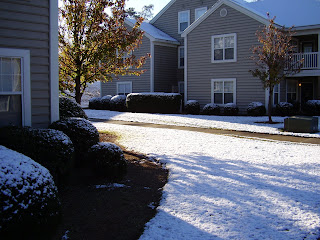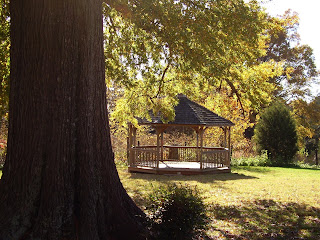Monday, December 8, 2008
Possession
For some reason, I had resisted reading A.S. Byatt's Possession after it had been suggested in one of my first graduate classes. (We had a choice, reading Possession or read her Angels and Insects. I chose the later because it was the end of the semester and it was shorter). However, the other day, with nothing to read, I came across Possession in the library and decided to give it a try. I really enjoyed it, partly because it gives such a different perspective on academia. In this model, English studies is full of intrigue and romance - rather different than the actual experience (although I find it satisfying). I am still not a huge fan of the poets, still preferring Victorian fiction, but it is nice to think about how poems might have had personal context for the poets, rather than being something I have to read without any hope of understanding it.
Friday, November 21, 2008
November Snow




An unprecedented event has occurred. Never in my memory have we had snow this early in NC. Usually, we are lucky to get this kind of heavy dusting in January or February, much less in November, before Thanksgiving no less. However, it seems to be confirmation of what my mom has said is in the Old Farmer's Almanac - colder weather this winter with a lot more snow than usual - at least for our area.
Listen to Your Reading Assignment
While I am largely a visual learner, I have found that audio reading has its benefits. Sometimes, reading assignments are so long that if I were to sit and read the entire thing, I would have time to do nothing else. But, if I listen to the book, I can do other things, like clean, crochet, cook, etc. Librivox is a website catalog of audio recordings of books that are in the public domain - which means it's free. They have most of the books I have needed for my 18th and 19th century classes. I have found that it works well if I listen to every other chapter, reading the ones in between. The only downside is, of course, that you can read faster than someone else can read to you - but it does mean that you can multi-task. And some of the readers have rather nice reading voices and they make attempts at reading with feeling and voice.
Wednesday, November 19, 2008
Gluten Tolerant!
Wow, after three months of near starvation (OK, a gross exaggeration), and no gluten, it now appears that I do not, in fact, have a gluten intolerance. Which is super good news on the one hand - pizza! pasta! bread! cake! And just in time for Thanksgiving, too. But, on the other hand, it means that I still don't know what's causing the headaches...
Friday, November 7, 2008
Autumnal Glory
Wednesday, October 29, 2008
Who, Me, Locavore?
I've been reading again, which should come as no surprise to anyone who knows me. My most recent read, as seen on the left, is Barbara Kingsolver's Animal, Vegetable, Miracle. In the book, Kingsolver and her family, who live on a farm in western Virginia, decide to spend a year eating locally. They raise their own produce and some of their own meat, obtaining their other food products from neighbors. They even make their own cheese.
This book comes in a procession of books about food that I have been reading, and this one in particular was recommended by my friend K. We had one of those moments of understanding when we both found we were trying to eat seasonally - I had been reading Michael Pollan's In Defense of Food and she had been reading Kingsolver.
While I find it quite unlikely that I will ever be able to completely sustain myself with any agricultural endeavors, I am trying to think about where my food comes from. As in, if it comes from California or Chile, then I probably don't want to eat it. If you think about it, these foods have been picked before their peak, chilled or stored, carted across the country (or the Western Hemisphere) and jostled onto a shelf at my grocery store. I have learned that it actually cheaper for grocery stores to buy produce from huge industrial food processers in CA, because they get tax credits that pay for the transportation (and all the gas, fossil fuels, etc that get burned in the mean time). And guess whose taxes pay for those? Yup. Ours. In the mean time, local farmers are having a hard time competing with the big guys, and it is almost impossible to find locally grown food in your local area.
There are a few options, however. The grocery store I do most of my shopping at carries milk from a dairy farm in a nearby town. The milk comes in glass bottles that you return to the store once you drink all the milk. I have seen the farm on the internet, and their cows actually get to walk around and eat grass (unlike most industrial cows).
We are also, as I have mentioned before, big fans of the farmer's market, where we find eggs, grassfed beef, bacon, and lots of fruits and vegetables. The only problem with this is that the Farmer's market is in the next county. Today, however, I stopped by a tiny produce store that I had noticed off the highway. It was amazing - they had almost everything I needed on my grocery list, including bacon, potatoes, apples, northern beans, squash, onions, and even cheese! And the prices were so much lower than those at the grocery store, I almost felt bad for the people I was buying them from. However, I imagine that I will be returning there again in the future on a regular basis.
So, here is my menu for the week, that is based on what's in season where I am:
Wednesday: salmon (obviously not local), brocolli, and brown rice (not local either, but with no gluten, I need carbs)
Thursday: leftovers
Friday: White bean and bacon soup, corn bread
Saturday: baked potaotes, brocolli
Sunday: cheese and squash quiche
Monday: shepherd's pie
Tuesday: leftovers
While I'm very serious about wanting to eat local, seasonal, and organic, there are also the needs to eat cheaply, easily, and gluten-free on a low budget with limited options. So, while it's not perfect, I think that it is a good start. Overall, my goal is not to adhere ridgidly to a list of legalistic food regulations, but merely to eat tasty, healthy foods, support my local economy, avoid the more perfidious aspects of industrialized food, and participate in/help to create a traditional food culture that is about nourishment, community, and connectedness with where food comes from, how it is grown, and who grows it.
Jack o' Lanterns
 Yea, pumpkins! I was very excited that Husband and I carved pumpkins the other night. We used pie pumpkins instead of the regular carving pumpkins, and I plan to use the innards to make pumpkin butter. I like these little guys on our porch. Since I bought candy today, we are officially ready for Trick-or-Treaters!
Yea, pumpkins! I was very excited that Husband and I carved pumpkins the other night. We used pie pumpkins instead of the regular carving pumpkins, and I plan to use the innards to make pumpkin butter. I like these little guys on our porch. Since I bought candy today, we are officially ready for Trick-or-Treaters!
Subscribe to:
Posts (Atom)





